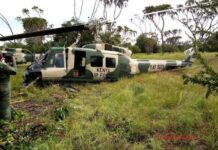On Wednesday, Rwanda remembered politicians killed during the 1994 genocide against the Tutsi, at the end of the mourning week of the 28th commemoration. This was with a call for an end to denial, negation and trivialization of the genocide.
The event held at the Rebero genocide memorial in Kicukiro district of the capital city Kigali, where wreaths were laid on the graves of 12 prominent politicians.
It was attended by senior government officials led by Augustin Iyamuremye, President of the Senate, families of fallen politicians and members of the diplomatic corps, among others.
“The fallen politicians we are remembering and honoring today, opposed to and stood firm against the bad politics, discrimination, hatred, injustice and other atrocious acts that culminated into the 1994 Genocide against the Tutsi,” said Iyamuremye during the somber ceremony.
He added that genocide perpetrators and their accomplices are using social media to deny and trivialize the 1994 genocide against the Tutsi which left more than a million people dead, saying that Rwandans should strengthen efforts in the fight against persistent denial and trivialization of the genocide.
“Genocide against the Tutsi was planned and executed by the bad politics of divisionism and discrimination that characterized the genocidal regime,” said Iyamuremye.
Remains of more than 14,400 genocide victims are buried at the Rebero genocide memorial.
The spokesperson of Rwanda’s National Consultative Forum of Political Organizations, Adrie Umuhire, called on political parties and politicians to focus on promoting unity, peace and equality among all Rwandans.
“As political parties, we are responsible for promoting unity and good politics that advocate for good governance and peace among Rwandans. Discrimination has no place in our politics and we shall never tolerate those politicians with divisive politics,” she added.
Umuhire said that genocide denial and trivialization among genocide perpetrators roaming freely abroad is being perpetuated through public seminars and social media channels.
She added that Rwandans should join hands in the fight against genocide denial and trivialization.
More than 1,000 Rwanda genocide suspects are still at large in regional countries and overseas, according to Rwanda’s Genocide Fugitives Tracking Unit.
After the national mourning week, genocide commemoration activities will continue until July 4 to mark the 100-day calamity, during which more than one million people, mainly Tutsi and moderate Hutus, were killed.
Perpetrators included extremists from Hutu ethnic group and Interahamwe, the youth wing of the then ruling party.











